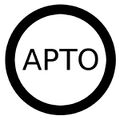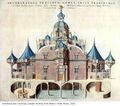Terrella (nonfiction): Difference between revisions
(Created page with "File:Birkeland_terrella_spiral_nebula.jpg|thumb|Kristian Birkeland's magnetised terrella. In this experiment, he noted two spirals which he considered may be similar to that...") |
No edit summary |
||
| (4 intermediate revisions by the same user not shown) | |||
| Line 1: | Line 1: | ||
[[File:Birkeland_terrella_spiral_nebula.jpg|thumb|Kristian Birkeland's | [[File:Birkeland_terrella_spiral_nebula.jpg|thumb|[[Kristian Birkeland (nonfiction)|Kristian Birkeland]]'s magnetized terrella. In this experiment, he noted two spirals which he considered may be similar to that of spiral nebulae.]] | ||
[[File:Gilbert_terrella.png|thumb|[[William Gilbert (nonfiction)|William Gilbert]]'s terrella.]] | |||
A '''terrella''' (Latin for "little earth") is a small magnetised model ball representing the Earth, that is thought to have been invented by the English physician [[William Gilbert (nonfiction)|William Gilbert]] while investigating magnetism, and further developed 300 years later by the Norwegian scientist and explorer [[Kristian Birkeland (nonfiction)|Kristian Birkeland]], while investigating the aurora. | |||
Terrellas had been used until the late 20th century to attempt to simulate the Earth's magnetosphere, but have now been replaced by computer simulations. | Terrellas had been used until the late 20th century to attempt to simulate the Earth's magnetosphere, but have now been replaced by computer simulations. | ||
| Line 6: | Line 8: | ||
<gallery> | <gallery> | ||
File:APTO logo.jpg|link=Algorithmic Paradigm Treaty Organization|December 9, 1901: In a high-profile [[APTO]] court case, aurora researcher and [[Gnomon algorithm]] theorist [[Kristian Birkeland (nonfiction)|Kristian Birkeland]] uses his experimental Terrella to prove that rogue mathematician [[Anarchimedes]] planned and attempted to execute [[Crimes against astronomical constants|crimes against the ionosphere]]. | |||
File:Uraniborg main building.jpg|link=Uraniborg (nonfiction)|August 8, 1575: Physician, physicist, and crime-fighter William Gilbert uses his experimental Terrella to stop alleged math criminal [[Anarchimedes]] from sabotaging the construction of Tycho Brahe's [[Uraniborg (nonfiction)|Uraniborg observatory]]. | |||
</gallery> | </gallery> | ||
| Line 18: | Line 24: | ||
== Nonfiction cross-reference == | == Nonfiction cross-reference == | ||
* [[Kristian Birkeland (nonfiction)]] | |||
* [[William Gilbert (nonfiction)]] | |||
* [[Mathematician (nonfiction)]] | * [[Mathematician (nonfiction)]] | ||
* [[Mathematics (nonfiction)]] | * [[Mathematics (nonfiction)]] | ||
| Line 24: | Line 32: | ||
* [https://en.wikipedia.org/wiki/Terrella Terrella] @ Wikipedia | * [https://en.wikipedia.org/wiki/Terrella Terrella] @ Wikipedia | ||
[[Category:Nonfiction (nonfiction)]] | [[Category:Nonfiction (nonfiction)]] | ||
[[Category:Machines (nonfiction)]] | [[Category:Machines (nonfiction)]] | ||
Latest revision as of 20:35, 3 September 2018


A terrella (Latin for "little earth") is a small magnetised model ball representing the Earth, that is thought to have been invented by the English physician William Gilbert while investigating magnetism, and further developed 300 years later by the Norwegian scientist and explorer Kristian Birkeland, while investigating the aurora.
Terrellas had been used until the late 20th century to attempt to simulate the Earth's magnetosphere, but have now been replaced by computer simulations.
In the News
December 9, 1901: In a high-profile APTO court case, aurora researcher and Gnomon algorithm theorist Kristian Birkeland uses his experimental Terrella to prove that rogue mathematician Anarchimedes planned and attempted to execute crimes against the ionosphere.
August 8, 1575: Physician, physicist, and crime-fighter William Gilbert uses his experimental Terrella to stop alleged math criminal Anarchimedes from sabotaging the construction of Tycho Brahe's Uraniborg observatory.
Fiction cross-reference
Nonfiction cross-reference
- Kristian Birkeland (nonfiction)
- William Gilbert (nonfiction)
- Mathematician (nonfiction)
- Mathematics (nonfiction)
External links:
- Terrella @ Wikipedia

